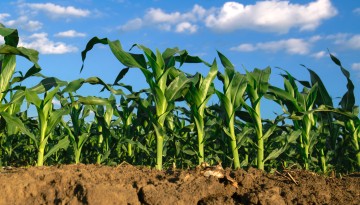Cargill Joins Cornell-Led Partnership to Promote Regenerative Agriculture in New York
Cargill is providing financial support to the New York Outcomes Fund, which launched this year and will provide farmers a financial incentive to adopt regenerative agricultural practices like growing cover crops and reducing tillage.
Initially, the New York Outcomes Fund received a grant from the Great Lakes Protection Fund to enroll 1,000 acres. With this additional financial support from Cargill, the program can enroll 10,000 acres, said Alan Martinez, senior manager for strategic partnerships at the Cornell Atkinson Center for Sustainability.
“This is the pilot year, so we’re testing demand, testing our capabilities to manage a new and innovative program, but given the progress we’re making, we think this could grow again by an order of magnitude next year and support New York’s ambition to lead the nation in sustainable agriculture,” Martinez said.
The New York Outcomes Fund uses a “pay-for-performance” approach that compensates farmers for positive environmental outcomes, including greenhouse gas reductions and water quality benefits produced when farmers implement regenerative practices. For example, planting cover crops (like buckwheat, ryegrass and red clover) between plantings of cash crops (like corn and soybeans) reduces erosion, improves soil health and water quality, and sequesters carbon. However, cover cropping requires upfront costs for farmers, including seed purchase and fuel. The New York Outcomes Fund seeks to underwrite some of those costs and incentivize farmers to try practices that have been shown to improve soil health and eventually increase farm yields, while protecting the environment. For example, while numbers are increasing, only about 10% of New York’s farm fields use cover crops, Martinez said.
In collaboration with farmers, the New York Outcomes Fund measures changes in greenhouse gas emissions and soil and water quality at farms, before and after implementation of regenerative practices. Farmers who enroll in the program are given half their contracted payment upfront and the other half when environmental outcomes are measured.
Cargill has sustainability commitments in three priority areas: climate; land and water; and people. In addition, the company is also committed to advancing regenerative agriculture practices across 10 million acres of North American farmland by 2030, said Evan Bild, Go-to-Market leader for Cargill’s environmental markets team.
“Paying for outcomes versus practices gives farmers flexibility as to what practices they want to implement based on their specific location, crops and unique business model,” Bild said. “It gives farmers full control over the decisions they make for their operations.”
The New York Outcomes Fund is a partnership between Cornell University, the New York Corn and Soybean Growers Association, and the Soil and Water Outcomes Fund. “This work in New York is exciting because of the partners involved: New York Corn and Soy understands the needs and challenges of local farmers; Cornell is a leader in innovation, supporting New York agriculture with research and on-the-ground support; and Cargill’s commitment to regenerative agriculture has set a standard across the private sector.” said Dan Yeoman, managing director of the Soil and Water Outcomes Fund. “We see strong interest from New York farmers – and New York state – in conservation practices that can support farm operations, soil health, and water quality and climate outcomes. The job of the New York Outcomes Fund is to make both the practices and the economics sustainable for farmers over time.”
Andrew McIlroy, a member of the New York Corn and Soybean Growers Association, enrolled over 40% of his Genesee County farm in the program earlier in the summer. “The team made enrollment easy,” he said. “Once we worked on the cover crop plan together, it didn’t take long to generate an estimate and receive the first payment.”
Alongside the outcomes payments, the New York Outcomes Fund also makes available experienced agronomists to provide technical assistance to farmers, guiding them through data requirements and practice implementation.
“The New York Outcomes Fund is a great tool for farmers to have in their toolbox and looks to support farming communities that want to try out new practices on their land,” McIlroy said.
The New York Outcomes Fund will be featured at the New York Corn and Soybean Growers Association Summer Crop Tour in Seneca Falls on Aug. 10.

